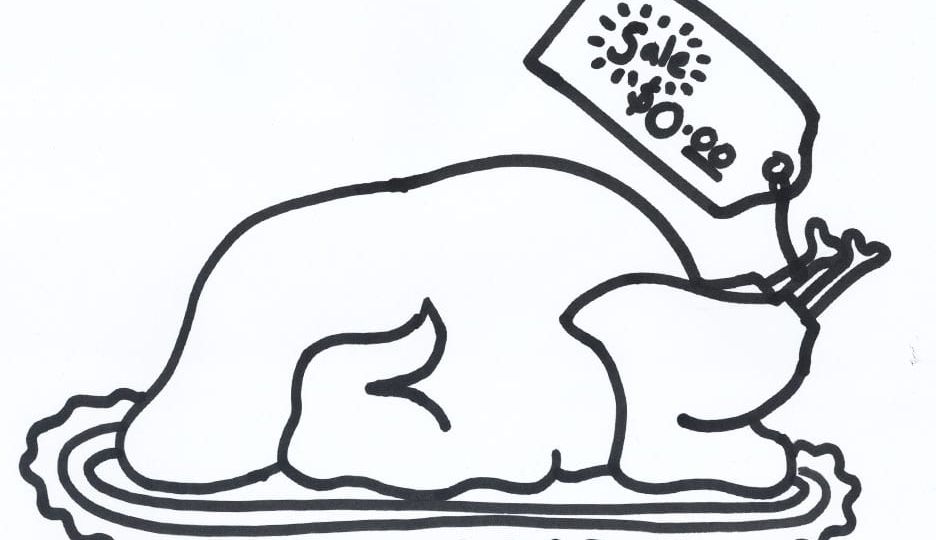
Last year on Black Friday, two individuals in Florida were shot and wounded after a fight broke out over a Wal-Mart parking spot. In Massachusetts, a two-year-old boy was abandoned in a Kmart parking lot. Punches were thrown and guns drawn at a Sears in Texas when an impatient shopper tried to cut the line.
Well you know what they say: ‘Tis the season to be jolly.
The day after Thanksgiving has been coined “Black Friday” due to the significant profits made by stores each year from eager holiday shoppers. This day marks a time when many stores begin to turn a profit for the year, putting them “in the black.”
However, this unofficial retail holiday has turned into a chaotic and increasingly violent day when shoppers leave their humanity – and apparently their children – in the parking lot and become vicious animals in the stores, fighting for the best bargains.
In years past, I have watched family and friends spend the day after Thanksgiving frantically running from store to store. I have simply smiled with pity and, I admit, a hint of judgment. But this year, after hearing the local news anchor refer to Thanksgiving as “Gray Thursday,” I’m putting my foot down.
The insanity of Black Friday has officially corrupted one of my most cherished days of the year: Thanksgiving. This year, both Target and Macy’s decided to open their doors for Black Friday shoppers at 8 p.m. on Thanksgiving day. Wal-Mart, Kmart, Toys “R” Us, Best Buy, JCPenny and a slew of others opened their doors even earlier that day at 5 p.m.
Congratulations, fellow Americans. We have successfully commercialized and corrupted yet another holiday. Thanksgiving has faded into the background, and Black Friday now commands national attention. But at what cost? Is this really worth it? I’m not convinced.
It seems it is time for a mandatory national viewing of “A Charlie Brown Thanksgiving” to remind us all of the true meaning of Thanksgiving – a day set apart to appreciate the blessings we have. Without any modern religious affiliation, Thanksgiving serves as one of the few neutral national holidays, centered solely on the blessings of family and friends.
It infuriates me to picture shoppers strolling along on Thanksgiving night, spending money on gifts that will most likely end up in a dumpster in six weeks. But what’s worse is that this selfish desire to shop requires hardworking employees to show up at work on a national holiday. Seriously? If more and more stores force workers to come in and tend to the needs of the selfish bargain-hunters, why even call it a holiday?
I can proudly say I have never been shopping on Black Friday, or Gray Thursday for that matter, and yet it remains my favorite day of the year. To me, it marks the true beginning of the holiday season. To celebrate, I wake up early, pull out my beloved tacky Christmas sweaters, turn on surround-sound Christmas music throughout the house and drink my first peppermint mocha of the season. I spend the day with my family, putting up holiday lights and decorations, enjoying the day off and avoiding the stores at all costs.
Despite my stubborn bargain boycott, I understand that Black Friday sales do serve some worthwhile purpose, sad as it may be. Black Friday alone saves many stores from being “in the red” at the end of the year, and employees rely on these extra hours to make it from paycheck to paycheck. Still, there is absolutely no need to let this day of shopping threaten the sacredness of Thanksgiving. Americans should not allow the day of consumerism to infiltrate the day dedicated to family bonding and feasting.
In “A Charlie Brown Christmas,” Linus says, “Those early Pilgrims were thankful for what had happened to them, and we should be thankful, too. We should just be thankful for being together. I think that’s what they mean by ‘Thanksgiving,’ Charlie Brown.”
A Peanuts cartoon character thinks more rationally than most Americans.
Is it really worth it to spend our time and money on Thanksgiving night funding and thus perpetuating a system that values material goods over relationships? Is it fair to subjugate hardworking individuals by forcing them to give up their holiday to assist shoppers? Do stuffed cash registers rather than bellies justify abandoned children, parking lot fights and store shootings?
You tell me.
Kiki Sykes ’16 sykes@stolaf.edu is from Kansas City, Kan. She majors in English and religion.

